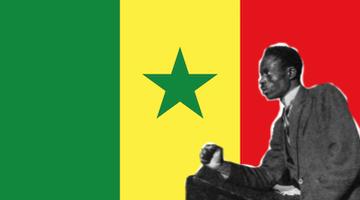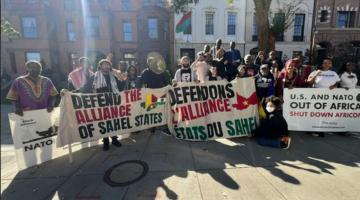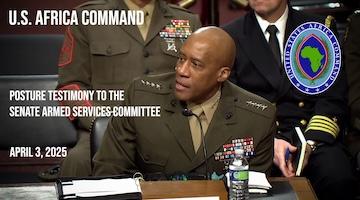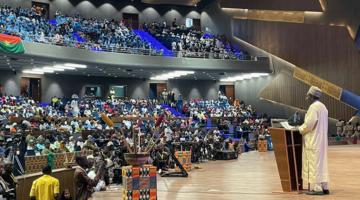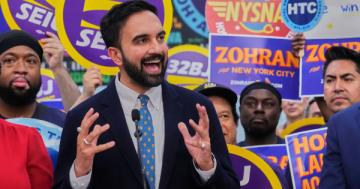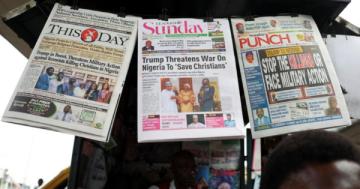Mobilization in Niamey, Niger in support of the AES withdrawal from ECOWAS. Photo: Echos du Niger
When the West slaps on tariffs, it’s 'economic security'—but when the Sahel rejects exploitative deals, it’s called a threat. From Cuba to Burkina Faso, countries have fought for self-sufficiency: controlling their resources, supporting local industry, and breaking free from foreign domination.
As the U.S. doubles down on tariffs and trade wars, African nations—particularly in the Sahel—find themselves at a critical juncture. The West calls its protectionism “economic security” and “national interest.” But when African states make similar moves to assert control over their land, labor, and futures, they are labeled authoritarian, unstable, or dangerous. Sovereignty for the West is lauded. Sovereignty for the South is a threat.
The truth is that protectionism has always been political. From Alexander Hamilton’s “infant industry” policies in the U.S. to South Korea’s strategic shielding of domestic industries in the 1960s and 1970s, protectionism has never been about fairness. It’s about national priorities and class alliances. In the Global North, protectionism often props up monopolies. In the Global South, it can be a revolutionary act.
The Sahel is acting now. Countries like Mali, Burkina Faso, and Niger have expelled French troops, withdrawn from long-standing neocolonial pacts, and challenged the Economic Community of West African States (ECOWAS). ECOWAS purports its primary goal as promoting economic integration within the region but often levies sanctions that do the opposite. These moves, often dismissed as populist or military overreach, are more than symbolic. They are seeds—imperfect and vulnerable, but seeds nonetheless—planted in the hope that a different world might grow.
But sovereignty isn’t declared. It is built, layered, and watered. The Sahel needs leadership and an economic, political, and cultural architecture that can sustain rupture. That’s where radical protectionism comes in. Radical protectionism is not a retreat into isolationism but an opening to grow new roots. This protectionism has three key pillars: regional production for regional consumption, non-negotiable public investment in essential sectors, and popular—not elite—control over industrial policy and national development.
We’ve seen versions of this story before. In the wake of colonial collapse, Zambia pursued Import Substitution Industrialization (ISI), protecting infant industries and seeking to capture value from copper exports. Though later undermined by external debt and internal mismanagement, Zambia’s early state-led industrial drive was part of a broader post-colonial push. Ghana under Nkrumah tried it by investing in domestic manufacturing and regional coordination. Tanzania’s ujamaa imagined socialist agriculture rooted in communal values. Each of these attempts faced sabotage—by the IMF, by comprador elites, by global markets allergic to African autonomy. But the desire was clear: to stop exporting raw materials and importing dependence.
Elsewhere, similar seeds took root. Post-revolution Cuba nationalized foreign holdings and built a sovereign medical system that continues to export vaccines and doctors. Malaysia used affirmative action for its Malay majority and aggressive industrial policy to build national champions and domestic capacity in electronics and finance. Venezuela under Chávez redirected oil profits toward food sovereignty and worker cooperatives; Bolivia under Morales regained control over gas and lithium, funding massive improvements in public health and education. Even socialist Yugoslavia, long before neoliberalism splintered it, created a decentralized system of worker self-management and regional equity that challenged Western capitalism and Soviet centralism.
These experiments weren’t perfect. Some faltered under corruption, others under pressure. But taken together, they teach us that protectionism is not inherently regressive. It can be revolutionary—if wielded for the people and not for power.
The first pillar—regional production for regional consumption—directly responds to Africa’s long-standing role in global capitalism as a supplier of cheap raw materials and a market for overpriced finished goods. In the Sahel, this is investing in local processing for agriculture, textiles, and minerals. It means connecting regional economies through rail, energy, and logistics rather than allowing Paris, Brussels, or Beijing to dictate value chains. These tactics are not theoretical. Mexico’s 1938 oil nationalization under Lázaro Cárdenas proved that a formerly colonized nation could tell international capital to stand down. Despite sanctions and foreign threats, Mexico created PEMEX, a sovereign oil company that funded schools, hospitals, and infrastructure for decades.
The second pillar is public investment in food, energy, housing, and education. This pillar requires reviving projects once shelved under pressure from the IMF and World Bank. Imagine a community-owned solar grid stretching from Senegal to Chad or public water systems free from corporate bottling plants. In the U.S., we saw this logic in the Tennessee Valley Authority during the New Deal. TVA was a publicly funded regional development initiative that brought electrification, jobs, and ecological stewardship to some of the poorest parts of the country. North Dakota remains the only U.S. state with a publicly owned bank, cushioning its economy against recessions and keeping credit flowing to local farms and businesses. These are not relics. They are blueprints.
The third pillar is perhaps the most crucial: radical protectionism must be people-centered, not elite-driven. The failure of past ISI efforts in Africa—whether in Zambia, Ghana, or Nigeria—was not due to protectionism but to its capture by bureaucrats and foreign-trained technocrats who saw the people as objects of policy, not architects of the future. The Cuban Revolution avoided this trap by tying sovereignty to mass participation—from neighborhood Committees for the Defense of the Revolution to creating a health sector responsive to public health, not private profit. In Yugoslavia, workers co-managed enterprises in a decentralized economy that balanced national planning with local control. These structures weren’t perfect, but they created real power separate from oligarchies and foreign boardrooms.
And none of this happens in a vacuum.
Africans in the U.S. have a critical role to play. We must build psychographic sovereignty within ourselves. Building psychographic sovereignty means creating political structures, cultural institutions, and economic networks rooted in our lived conditions but globally connected to the struggles of Africa and the Global South. We must be strategic in our alliances, unafraid to work with those who share our aims—our enemies’ enemies—while also maintaining an uncompromising stance on the dignity and rights of our people. This effort is less about proving our humanity to the world and more about asserting our coordinated power. We must use our position to shift the balance in favor of sovereignty and collective liberation. We must craft institutions that are culturally grounded, ideologically coherent, and materially resilient, institutions that think not in terms of immediate gratification but in terms of decades, building foundations that can outlast the forces of imperialism.
In this global context, Africans in the U.S. can leverage several strategic levers. First, we must invest in formal and informal education that centers on African history, global struggles for sovereignty, and radical economic thinking. Building awareness and solidarity among the African diaspora can create a unified, informed force capable of exerting pressure on U.S. foreign policy to respect African sovereignty. We also have the power to organize economically, using cooperative models to create alternative economic systems in our communities. Supporting Pan-African businesses, creating self-sustaining enterprises, and circulating capital within our networks would help to build the infrastructure needed for sovereignty. Additionally, by aligning ourselves with movements across Africa—particularly in the Sahel—we can advocate for intra-African trade policies instead of dependence on Western markets. Leveraging our position in the U.S., we can advocate for sanctions, divestment campaigns, and other forms of economic pressure on multinational corporations that exploit African resources, holding them accountable to working-class people who produce those resources.
Our role is to push for political change that aligns with the struggle for sovereignty across the globe, to build solidarity from within and without, and to make sure that the global movement for liberation is not just a political abstraction but a material reality.
Radical protectionism is not about shutting the world out. It’s about making space to breathe, grow, and build on our terms. It’s about creating the conditions where resistance becomes infrastructure and our imagination becomes economy. The West will say it’s dangerous. But what they fear isn’t regression—it’s rupture. And the seeds of rupture are already in the ground.
This moment is not just another chapter in the long history of resistance; it is a moment to shape the future. The seeds of sovereignty have been planted. If we act, we can cultivate a new world where Africa and its people, both on the continent and in the diaspora, are the architects of their destiny. The opportunity is here. It is ours to seize.
Kai Cash is a native of the Bronx, New York, a Black Alliance for Peace Member, and the Chief Strategist for One Billion Trees for Africa living in Brooklyn, New York.





